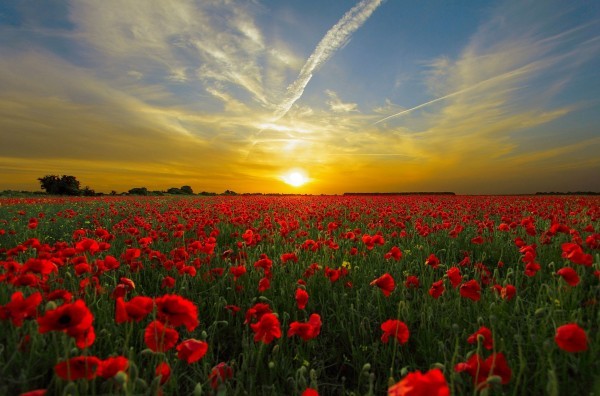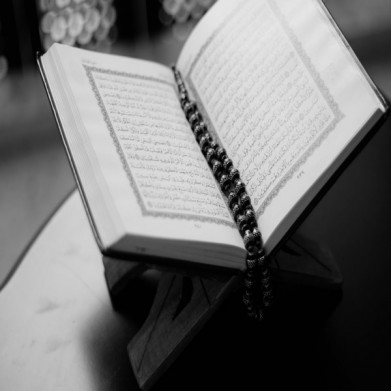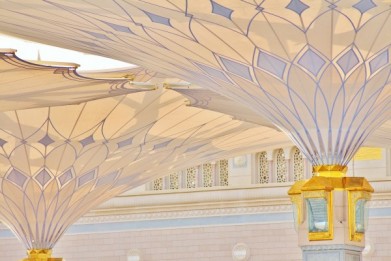And to Allah belong the beautiful names, so invoke (call on) Him by them
His beautiful Names
Beautiful Names of God (Allah)
The Glorious Qur’an and Prophet Muhammad teach us about the names of Allah, the One True God. For example, the Glorious Qur’an states:
(7:180)
When we supplicate to Allah, we are encouraged to call Him by His beautiful names or by the name that is related to our request or need. For example, if our request concerns our provision in life, we might call out to Al-Razzaq, The Provider. These names do not indicate that Allah is more than one being; they are names that describe the different attributes that belong to the One True God (Allah).
We human beings can never comprehend the greatness of Allah, but the more we know about Him and what pleases Him, the better we can love and worship Him. Learning about Allah – through studying and understanding His names and attributes – brings us peace of mind in this life and the next because we acknowledge that everything is in His hands and happens according to His Will.
It is not appropriate for a human being to use a name that belongs to Allah alone. Muslims often have names that begin with Abdul (meaning “servant of”) followed by one of the names of Allah. Thus, Abdullah means “servant of Allah”, “Abdul-Rahman” means “servant of Al-Rahman (The Compassionate)”, and so on.
Knowing more about the names of our true God (Allah), and believing truly in Him and His attributes, leads us to bear in mind, whenever we act or interact with others, that Allah is:
The Compassionate, The Most Beneficent, The Most Gracious, The Most Merciful, The Judge, The All-Knowing, The All-Seeing, The All-Forgiving, The Most Kind, The Truth, etc…
It is important that we put these beautiful attributes into practice in our own lives, to the extent allowed by our human reach and capacity.
Now, let’s learn more about the names of Allah.
Some of the names of Allah in Arabic and their meanings in English:
Allah: The proper name of the One True God.
Al-Rahman: The Compassionate, the Merciful, Who has mercy on all creatures.
Al-Rahman: The Most Merciful. While we can never come close to His mercy, we can appreciate it and try our best to be merciful to others.
Al-Malik: The Sovereign Lord, Who has authority over all the Heavens and Earth.
Al-Noor: The Light, Who illuminates and guides us, making the invisible visible. In a chapter called Al-Noor, the Qur’an tells us,
Allah is the Light of the heavens and the earth
(Qur’an 24:35)
Al-Quddoos: The Holy, the Pure, the Blessed.
Al-Salam: The Source of Peace and Perfection, Who is free of any imperfection. He is always perfect; He does not have human characteristics such as becoming sick, hungry, thirsty, or cold.
Al-Hakam: The Judge, Whose judgment is perfectly just and cannot be escaped.
Al-Aleem: The All-knowing, Who knows all that is apparent and all that is hidden, in the past, present, and future.
Not a leaf falls but that He knows it
(Qur’an 6:59)
Al-Baseer: The All-Seeing, Who sees all that goes on in the entire universe.
Al-Samee: The All-Hearing, Who hears everything. When we call or pray to Him, He hears us.
Al-Adheem: The Great One, Who is greater than anything or anyone in His creation.
Al-Ghafoor: The All-Forgiving, Who constantly forgives those who repent and return to Him.
Al-Tawwab: The One Who accepts repentance. Allah loves for sinners to repent to Him, and He continuously welcomes and accepts our sincere repentance. In contrast, human beings, even those who are closest to us, eventually tire of accepting our mistakes and of welcoming us back afterwards with the same enthusiasm.
Al-Ali: The Most High, The Sublime, Who is high above His creation.
Al-Wadood: The Most Loving, Who loves those who are righteous and obedient, and manifests that love for us in our everyday lives. We should show gratitude for His love, and we should love others by wishing for them what we wish for ourselves.
Al-Raoof: The Most Kind, Whose tenderness, gentleness, pity, and mercy are limitless.
Al-Razzaq: The Provider, Who provides sustenance, safety, and guidance to every living thing. Each of us will receive the provision that has been written for us, but we must work for it – in permissible ways, though, not by fraud or corruption.
Al-Haqq: The Truth, the One True God, Whose words are the truth. Knowing that He is the antithesis of falsehood, we must strive to discover and uphold the truth in all we say and do – whether that truth is for us or against us.
Al-Haleem: The Forbearing, Who is calm, patient, and never hasty, even with the sinners, wrongdoers, and those who deny or disbelieve in Him. Allah overlooks our mistakes, and we should strive to do the same with those around us because in reality, those who hold grudges only hurt themselves.
Al-Mujeeb: The One Who Responds, the One Who answers our prayers. Allah loves for us to ask His help through supplications, and He loves to answer our prayers, although He may not always answer when or how we wish, because He knows better than we do what is best for us.
Attributes and Qualities of God (Allah)
Prophet Muhammad said,
The absolute qualities of beauty and perfection belong to Allah. Indeed, Allah loves beauty
(Sahih Muslim)
Some of the attributes and qualities that distinguish the only true God (Allah) from others who claim (or are claimed) to be God are:
- This One True God (Allah) is unique in terms of His attributes. No one is like Him, and no human or animal characteristics can be attributed to Him.
- This true God (Allah) is the Creator; He is neither created nor born.
- The One True God (Allah) created us to worship Him alone. When we worship God only, we are liberated from the worship of idols, saints, celebrities, money, or anything else.
- The true God (Allah) is ONE, not three or more! He has no partners or equals.
- God (Allah) cannot be seen by human beings or other creatures in this life.
- God is not manifested or incarnated in any physical forms of His creation.
- God is eternal; He does not die or change.
- God is not in need of anything or anyone such as a mother, a wife, or a son; nor does He require food, drink, or any kind of help. It is others who need Him.
We can use these criteria and qualities (as well as others belonging to Him alone) to evaluate any claim that someone or something is God.
Basic Islamic Names and Terms
Allah: In Arabic, Allah is the proper name of the One True God, the Creator. Islam teaches that Allah is the true God of all humankind. Christian Arabs use this name (Allah) to refer to God, and it is the word used for God in Arabic-language Bibles.
Muhammad ﷺ (may Allah’s blessings and peace be upon him): the last Prophet of the One True God (Allah); sent to all humankind.
The Glorious Qur’an: the final Word of the One True God (Allah), as revealed to Prophet Muhammad.
Islam: submission to the Will of the One True God (Allah), the Creator.
Muslim: one who submits to the Will of the One True God (Allah), the Creator.
Related Articles
Various of subjects and articles
Answering Humanity's Critical Questions
Islam answers humanity’s most critical and significant questions, such as: - What is the truth? - Who created us? - Is there a God? - Who is our true God? - Who is God’s final prophet? - Whom should we worship? - Who are we? - Why are we here? - What happens after we die? - What will the n...
What did they say about the Quran?
“From such close intercourse with the Muslims and so diligent a study of their literature when we find even so bigoted an opponent of Islam as Alvar acknowledging that the Quran was composed in such eloquent and beautiful language that even Christians could not help reading and admiring it.”
The Final Messenger
Muhammad ﷺ (may Allah's blessings and peace be upon him), son of Abdullah, was born in Makkah around the year 570 CE. He became known by his people as Al-Amin (the trustworthy one).
Just One Message
Straight to the point After the creation of Adam, just one original message has been repeatedly delivered to mankind throughout the history of humanity. Thus, to remind people about it and bring them back on track, many prophets and messengers including Adam, Noah, Abraham, Moses, Jesus, and Muhammad were sent by the only true God to convey this...
Just the Tip of The Iceberg
Just the Tip of the Iceberg ‘It’ … - inspires us to have good intentions, positive attitudes, and kind feelings towards others. -teaches us to forgive others, and to love for others what we love for ourselves. - urges us to smile sincerely and to be cheerful and optimistic. - guides us to act and treat others politely and respectf...
The One True God in the Bible (The Old Testament)
Hear, O Israel: The Lord our God is one Lord. (Deuteronomy 6: 4) Has not the One God made and sustained for us the spirit of life? (Malachi 2: 15) You may know and believe Me and understand that I am He. Before Me no god was formed, nor shall there be any after Me. I, I am the Lord, and besides Me there is no Savior. (Isaiah 43:...



 Read More
Read More




